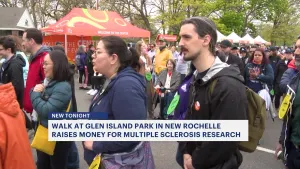More Stories
Council Member Erik Bottcher is sounding the alarm about a growing crisis in his district.
"I'm calling this a humanitarian crisis," said Bottcher.
He says the west side of Manhattan is in need of serious help and is urging Mayor Eric Adams to expand a special program that aids people with mental health issues.
"It's not uncommon in our community to see people on the street suffering from untreated mental illness, people engaging in intravenous drug use in public," he explained.
Bottcher says the issue has only worsened since the 2020 pandemic. Problem areas include West 4th Street in the Village, 21st Street and Eighth Avenue in Chelsea and side streets in Hell's Kitchen. This prompted him to send a letter to Mayor Adams pushing for the expansion of the 'B-Heard' program, which sends mental health professionals along with EMTs to respond to 911 calls about mental health crises.
"In our district, local cops respond to 911 calls for medical health crises, and they're not equipped to handle these issues," Bottcher stated.
The B-Heard program was launched in 2021 in Harlem and has since expanded to Washington Heights, Inwood and parts of the Bronx. According to recent city data, in its first two years of operation, B-Heard responded to over 9,000 911 mental health calls.
A City Hall spokesperson emphasized Mayor Adams' commitment to addressing severe mental illness proactively. The spokesperson said, "We’re engaging with people suffering from severe mental illness, substance use disorder, and unsheltered homelessness where they’re at — in our parks, subways, and on street corners — while keeping our neighborhoods safe."
For Bottcher, this issue is deeply personal.
"When I was 15 years old, I spent a month in a mental health hospital after a series of suicide attempts. That treatment saved my life, but it's unavailable to the vast majority of New Yorkers, especially those who are poor or people of color," he shared.
The City Hall spokesperson also acknowledged the importance of Bottcher's concerns but did not mention if the B-Heard program will be expanded.
More from News 12
2:01

Thousands gather in Manhattan for 105th annual Veterans Day Parade
1:41

2 more arrests made in Manhattan assault on former NY Gov. David Paterson
1:28

Man surrenders to police after alleged Zionist threats on Manhattan subway
0:45

Former President Donald Trump responds to his guilty verdict
0:23

Biden releasing 1 million barrels of gasoline from New Jersey, Main reserve in bid to lower prices at pump
1:51
